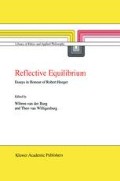Abstract
A well-known problem of reflective equilibrium methods is how to avoid or at least correct for a methodological conservatism or, more positively formulated, how to guarantee adequate critical input. If in the process we use only our own convictions, of whatever kind, how can we hope to do more than systematising our prejudices? In other philosophical theories, the common solution is to suggest that there is some Archimedean point or locus of certainty, but this solution is clearly not available for reflective equilibrium methods.
I would like to thank Marcel Verweij en Anton Vedder for their helpful criticisms of an earlier draft.
Access this chapter
Tax calculation will be finalised at checkout
Purchases are for personal use only
Preview
Unable to display preview. Download preview PDF.
References
I have elaborated this definition in Van der Burg (1997). Taekema (1998) offers an interesting analysis of three ideal-typical models of ideals: cultural, heroical and transcendental. My definition is a combination of the cultural and transcendental models.
The distinction between concept and conception is central to Dworkin’s theory of interpretation (Dworkin 1978) but can also be found in Rawls (1971, 3 ff.). In Rawls (1993, 14), he traces the distinction back to Hart (1961, 155–159).
Cf. Brom (1997, 65); cf. also Van den Brink (1997, 153 ff.).
In Van der Burg (1991), e.g., I applied it to democracy and argued that we cannot understand and justify our considered judgements regarding democracy unless we refer to a larger democratic ideal. At Tilburg University, we have recently started a substantial research programme in which the importance of ideals is investigated, both in theory and in practice, for law, morality and politics (cf. Van der Burg and Brom 1998).
Editor information
Editors and Affiliations
Rights and permissions
Copyright information
© 1998 Springer Science+Business Media Dordrecht
About this chapter
Cite this chapter
van der Burg, W. (1998). Ideals and Ideal Theory: The Problem of Methodological Conservatism. In: van der Burg, W., van Willigenburg, T. (eds) Reflective Equilibrium. Library of Ethics and Applied Philosophy, vol 2. Springer, Dordrecht. https://doi.org/10.1007/978-94-011-4972-3_6
Download citation
DOI: https://doi.org/10.1007/978-94-011-4972-3_6
Publisher Name: Springer, Dordrecht
Print ISBN: 978-94-010-6087-5
Online ISBN: 978-94-011-4972-3
eBook Packages: Springer Book Archive

